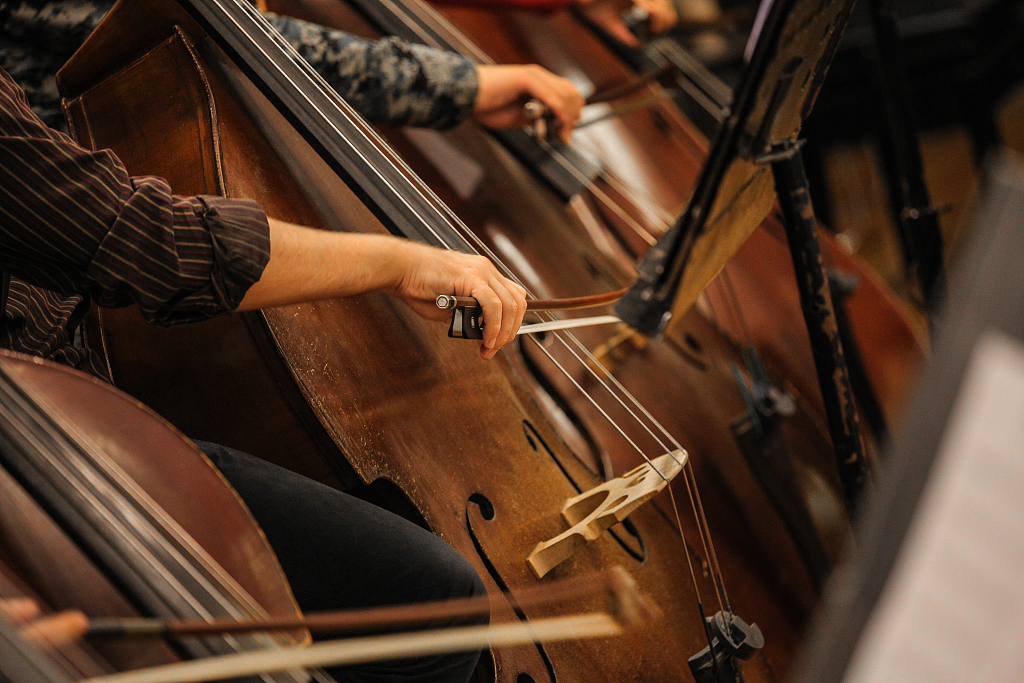The COVID-19 epidemic has changed the way young people entertain themselves in China as numerous offline shows have been cancelled and public places shut down to avoid mass gatherings and contain the spread of the disease.
For those quarantined at home, many online music and short video platforms have teamed up with livestreaming platforms to create some new forms of entertainment, such as "cloud karaoke," "cloud music festival" and "cloud disco party."
For those who love karaoke, Changba, which literally means "Singing Bar," one of China's most popular mobile karaoke apps, has launched a series of online karaoke experiences, including cover song competitions and livestreaming karaoke.

Chinese music industry has been hit hard as many live shows and concerts were cancelled and postponed due to the COVID-19.
Chinese music industry has been hit hard as many live shows and concerts were cancelled and postponed due to the COVID-19.
With nearly 20,000 concerts and live shows being cancelled or postponed from January to March, China's music industry has been hit hard by the epidemic. It has incurred a loss of more than two billion yuan (285 million U.S. dollar), according to the statistics released by China Association of Performing Arts.
Nevertheless, young people who can not go to the concerts and live shows are now given the chance to meet their favorite artists online as many musicians have turned to livestreaming.
To survive the crisis, musicians, music companies and online music platforms have come up with innovative ways to keep the music playing – by livestreaming their shows online.

Poster of "Stay at Home" music festival launched by Modern Sky and Bilibili. /Modern Sky
Poster of "Stay at Home" music festival launched by Modern Sky and Bilibili. /Modern Sky
Chinese online video platform Bilibili has teamed with Modern Sky, China's largest independent record company, to create a "Stay at Home" concert series, livestreaming their previous Strawberry Music Festival shows for five days from February 4 to 8, which had attracted more than 490,000 viewers.

Chinese rock band New Pants performs at Strawberry Music Festival in Xiamen, southeastern China's Fujian Province, October 27, 2019.
Chinese rock band New Pants performs at Strawberry Music Festival in Xiamen, southeastern China's Fujian Province, October 27, 2019.
NetEase Cloud Music, one of the most popular music streaming service in China, has teamed up with 85 groups of musicians, mostly independent musicians, and launched an online "Bedroom Music Festival." It has been going on for nearly a month.

A Weibo screenshot of NetEase Cloud Music's poster "Bedroom Music Festival."
A Weibo screenshot of NetEase Cloud Music's poster "Bedroom Music Festival."
The total number of viewers has exceeded 16 million and the total viewing time surpassed nearly 22 million minutes, with more than 6.8 million real-time comments.
The overseas music industry is also facing a downbeat as many concerts, opera shows and world famous music festivals, such as Coachella and South by Southwest, have been either postponed or cancelled.

Concert halls and opera houses have been closed across the world due to the COVID-19 pandemic.
Concert halls and opera houses have been closed across the world due to the COVID-19 pandemic.
Amid closures of cultural venues across the world in an attempt to contain the spread of coronavirus, classical music venues in Europe have also turned to livestreaming their concerts in an effort to comfort music fans.
Berlin Philharmonic livestreamed a free concert without onsite audience for fans online as the legendary orchestra said it will be closed until April 19.
English pop singer James Blunt went ahead with his concert in Hamburg, Germany, livestreaming the performance in an empty venue to fans around the world.
Although the COVID-19 pandemic has posed a great challenge to the entertainment industry, it also brings opportunities.
Industry insiders believe that online entertainment has the potential to become a trend in the near future, as it is widely accessible to people around the world without geographical restrictions. And it will probably change people's existing entertainment consumption pattern subtly, reported People's Daily.